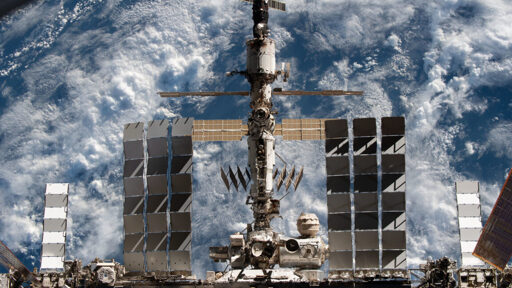The transfer tunnel, known by the Russian acronym PrK, connects the Zvezda module with a docking port where Soyuz crew and Progress resupply spacecraft attach to the station.
Air has been leaking from the transfer tunnel since September 2019. On several occasions, Russian cosmonauts have repaired the cracks and temporarily reduced the leak rate. In February, the leak rate jumped up again to 2.4 pounds per day, then increased to 3.7 pounds per day in April.
“The Russian position is that the most probable cause of the PrK cracks is high cyclic fatigue caused by micro-vibrations,” Cabana said on November 13. “NASA believes the PrK cracks are likely multi-causal, including pressure and mechanical stress, residual stress, material properties, and environmental exposures.”
Crew members aboard the space station are keeping the hatch leading to the PrK closed when they don’t need to access the Progress cargo freighter docked at the other end of the transfer tunnel. Russian cosmonauts must open the hatch to unpack supplies from the Progress or load trash into the ship for disposal.
As a precaution, Barratt said space station crews are also closing the hatch separating the US and Russian sections of the space station when cosmonauts are working in the PrK.



You’re describing a thermal balance. Temperature is a property of matter which doesn’t exist in a perfect vacuum. That said, the space around ISS is far from a perfect vacuum (atomic oxygen sucks). In any case, the typical temperature model starts to breakdown with increasing vacuum.
Sure, but in any practical sense it is a temperature. It would be silly to say space isn’t cold (or hot depending) from a regular person’s perspective. Thermal balance creates an effective temperature, even if it wouldn’t be described as a temperature within some technical frame of reference.
That’s a fair point.